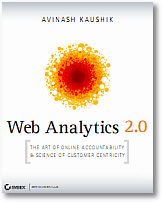Seven Skills to Look for in a Web Analytics Manager
 A reader asked this simple question recently:
A reader asked this simple question recently:
> thought you might have some ideas on what kind of skills or experience you see as essential in leading a Web Analytics group
Ahhh… a bigger challenge. I started my reply with:
This is such a big question, I don't know if I can give a pithy answer.
But then did go on to give a pithy answer outlining six key skills that I thought were essential. : )
Hypothesizing that there are perhaps others who might find the answer helpful I wanted to post it here as well. Since I have a few more minutes now than when I replied to JH I’ll add a bit more context, hope you find it useful.
Ok here are six (plus one bonus) absolutely obvious things to look for in a Senior Manager, Web Analytics:
1) Deep passion for the space.
Web analytics is a tough, sad and an overwhelming business. It is hard to find answers, it is harder still to find insights that will move you beyond the normal “how can we stay afloat for another month” business. If you don’t absolutely love the space and have a deep rooted passion for it then it will be really hard for you to survive, even harder to lead a team.
You have to love the web, you have to love its life changing power, you have to believe that at some level you, yes you, have the power to change people’s lives by killing reports that shows, in 8 font, conversion and visitors stats and replacing them with analysis that will fundamentally improve the experiences of your customers and ease their stress. Got Passion?
2) Loves change.
 This one wipes out even the very best out there. The web changes and grows and morphs a like a alien being. You just got used to pre-fetching and here is google trying to guess searcher intent (and now “personalized search” where even your awesome organic listing might not result in you being #1) and then come RIA’s and Ajax and then will come something else and like a tidal wave it keeps coming. It takes a special person to build things today with the mandatory mindset that you will throw them away next week or next month.
This one wipes out even the very best out there. The web changes and grows and morphs a like a alien being. You just got used to pre-fetching and here is google trying to guess searcher intent (and now “personalized search” where even your awesome organic listing might not result in you being #1) and then come RIA’s and Ajax and then will come something else and like a tidal wave it keeps coming. It takes a special person to build things today with the mandatory mindset that you will throw them away next week or next month.
You like change, you like learning new things, you have a solid .opml file that proves you are plugged in, you have patience. In interviews ask for how many different data collection mechanisms that candidate has used, how many tools, how many research methods they have been exposed to (if not actively used) etc. Ask for one thing they know of that will mess up analytics world in the next 180 days. If they have a answer, you have a winner. Don’t let go.
3) Questioning of data to to point of being rude.
The core problem with all the tools today is that they rely on data that usually tells you little, especially if you use only clickstream. You also get lots of different type of people coming to your website for different purposes, multiple times, using different browsers and locations. We take this really really complex behavior and apply simplistic reasoning to it (“x % saw the products page so that means z success for our goal”!).
More than analysts managers of analysts have to have a deep sense of humility about that is possible. They question the data and analysis and bring a new and different perspective and can overcome cool recommendations from the latest consultant. All with the simple goal of keeping it real.
(Lots has been written about the quality of data we have, this is not that. For more on that click here.)
4) CDI baby, CDI. (Customer Driven Innovation.)
 Great web analytics Managers believe that people in the company are usually wrong about what your customers want. In fact they are shy about saying: “Omniture is saying qqq about the home page behavior hence we need a left navigation on amazon because I always use the left nav on amazon to find what I need.” [Replace Omniture with CoreMetrics or HBX or ClickTracks or WebTrends or …..]
Great web analytics Managers believe that people in the company are usually wrong about what your customers want. In fact they are shy about saying: “Omniture is saying qqq about the home page behavior hence we need a left navigation on amazon because I always use the left nav on amazon to find what I need.” [Replace Omniture with CoreMetrics or HBX or ClickTracks or WebTrends or …..]
True innovation and sustainable competitive advantage will come from actions that are Customer Driven. Not always but most of the time.
What this translates into is a Manager who has had exposure to Testing and Usability and Surveys and Site Visits and Field Studies or Market Research and all that. Or a couple of those. What you are looking for is someone who can bring to bear their experience to find the right ways for you to apply the power of analytics and research to find the right answers for your customers.
5) Not really good “numbers gods”.
This is bound to be controversial (so do share your feedback). I find that if your core qualification is that you are a Numbers God then you will probably not make a good people manager. Numbers God is defined as: Someone who chomps down massive spreadsheets for breakfast, lunches on SPSS and SAS, snacks during the day on a couple of complex multivariate statistical regression models and can’t go to bed without a warm glass of mathematical trend correlations.
You need this person, my suspicion is not as a manager.
Couple of reasons. Numbers Gods like to control things (that’s what makes they good at “godding” numbers). They like perfection and like to nail everything down. They like to predict and anticipate and might have a tough time with ambiguity.
Usually the best way to become a Web Analytics Manager is to become a good Web Analyst. That is of course possible, but being great with numbers, the very reason you consider someone (“afterall you are good with numbers Joey, why don’t you lead a team of “numbers people””), might not make them a good Analytics Manager. See all other skills above and below.
6) Raw business savvy and acumen.
Without this one can never escape the trap of numbers.
 Recently someone shared the result of five days of deep analysis. The core output was correlations between two different trends trying to nail down the ability of one to predict the other. One look at it and it was pretty clear that this nice person had not asked two basic business questions that would have saved five days of work (and stopped sub optimal jumping of conclusions).
Recently someone shared the result of five days of deep analysis. The core output was correlations between two different trends trying to nail down the ability of one to predict the other. One look at it and it was pretty clear that this nice person had not asked two basic business questions that would have saved five days of work (and stopped sub optimal jumping of conclusions).
It is not that the person was not smart, she/he is numbers brilliant, it was that they did not have basic business acumen (I’ll define it as the ability to step away from the numbers and consider the business interaction that is being analyzed overlaid with business strategy).
Atleast in your Manager you need someone who is street smart, who has business experience, how understand business strategy, who can see the forest from the trees. Analytics moves fast, business moves smarter. Your Manager will put data in the service of business and not vice a versa.
7) Impressive people skills.
- The number one reason people leave their jobs is not because they don’t like their jobs or companies or teams. They leave because they dislike their managers.
Hopefully above you have seen a consistent trends of emphasis on non-numbers experience but rather a stress on customers and analytics in general and change and business savvy. But the number one skill you are looking for is the ability to truly lead a team. Imagine some of the tough things above, your Manager not only has to deal with all of them but on top of it lead a team of, what is sure to be, diverse temperamental people and get them to sing in harmony. Really hard to do (trust me I struggle with this!).
 Find a person with good people skills, find a person your Numbers Gods will respect, find a person who can schmooze up to Sr Management and get your analysts anything they want.
Find a person with good people skills, find a person your Numbers Gods will respect, find a person who can schmooze up to Sr Management and get your analysts anything they want.
(I wrote a post a little while back called Three Spire’s of Great Leadership. I would recommend that post if you are really looking for a great leader, web analytics or otherwise. Very few people can pull of true Leadership as it relates to leading a team of people, the post shares my humble view of what the secret sauce is.)
Here's a interviewing tip: Ask them if they will give you contact info for the last team they lead, the whole team. Then randomly just call two or three folks and ask them what they think of your candidate. I promise you that you'll be surprised.
What do you all think? Many of you are practitioners, do your Managers have these skills? What makes them special? What am I missing (afterall I am a manager!)? Does the above make any sense? Please share your feedback.
I have to admit that for me moving from a Senior Individual Contributor to Manager was a tough transition. It took me a little time to realize that “people” were not “resources”. But I would never go back, even though financially I could make equivalent amounts being a individual contributor. It is amazingly empowering that you can take a group of people and together you can have exponentially higher impact than you by yourself ever could.
Managing people can be a pain sometimes, it can be like taking care of my two little children, but it can also be very personally rewarding and it can give you a sense of accomplishment that you can take home after your sexy web analytics report has reached the bottom of a recycle bin. : )
[Like this post? For more posts like this please click here.]











December 11th, 2006 at 06:04
I love posts like this where I can think, "I can do that!" and "Aah, yeah – lacking there." :) It seems like one of the hardest things about transitioning from analyst to manager would be the letting go/ delegation aspect. (And this is probably a nuance under people skills/ not numbers guy) You have to let people make mistakes, own their work, and understand you can't do everything. Maybe I am a control freak, but that sounds pretty hard! Maybe that was a challenge you had to face by being a senior individual contributor? (vs a newbie?)
December 11th, 2006 at 06:21
Avinash, reading you in the morning with a cup of coffee is at least a thousand times better than crunching any amount of data anytime in the day! :)
That being said, I think your post is true for people in the web analytics field, but I would go as far as saying it's true of any good manager.
Two angles on your post:
1) Early in my career I read a book called "Becoming a technical leader", by Ken Orr, where he highlighted the skills of a good leader, but also the fact that not everyone can/should follow what appears to be a natural path to management, and would be better off becoming a "guru" in their field of technical expertise.
2) Oftentimes, a good manager can "feel" your passion, your emotions, and your frustrations because he/she had a similar "way of the cross". I like the fact that you don't tell anything about MBA's or whatever diploma would make you a good manager. Experience and enlightenment doesn't come with a nice piece of paper…
Stephane Hamel
http://immeria.net
December 11th, 2006 at 07:47
Great insight Avinash – as always!
December 11th, 2006 at 10:18
Jen: It is not just delegation, though that is surely a challenge.
It is the realization that the team (your direct reports) don't exist to make you successful. You exist to make each and every one of them successful.
Imagine all of the things you would do differently if you were working not to make yourself or your company successful but each member of the team successful (and of course if they are successful then so will you).
This sounds obvious and it is easy to pontificate about it in a blog :), it is something I think many people, myself included, struggle with.
Delegation as you can imagine is just one facet of this. There are so many more things.
Thanks for the kind words and thoughtful comments, they are always welcome.
December 11th, 2006 at 12:56
Great post, going to use this!
December 12th, 2006 at 05:08
Hey Avinash..!
Well this is exactly what i was looking for, i am involved in web analytics in a small way now but now aggressively pursuing it as a career.
These inputs are just awesome, it would be also great if you could suggest some of the Indian company i can probably look for as a career.
Thanks
Anil
December 14th, 2006 at 11:39
Hi Avinash,
Thanks for this great post (and this mornings' mail). Yes, as Jen mentioned, my first reflex was also autocritisism. I'm good at this, not at that, blablabla, looking at my little belly button, sorry.
Then, I started thinking about my team. Now, we are in a different position as my little team of European experts are consultants for other clients so, it couldn't really fit into your description but it did make me reflect upon the place that each member of the team holds within our business unit. As we are growing, responsibilities shift and for some of us (including me), it's difficult to delegate and move an inch higher in the hierarchy.
It seems that with every inclusion of a new member, it doesn't always turn out as I imagined (hey, I'm not always totally wrong) but we discover new passions, new interests that we try to build upon in order to come to a more complete offering for our clients. I also find shifting clients between team members because the communication is not always ideal, the flow is not there and works better with someone else. I'm thinking about shifting a particular client back to me right now, still need to discuss it with Siegert.
But your focus was more on what I see with clients so I'll try to relate to that perspective. First of all, here in Europe, they are rarely a team actually. It's often a single person. And it's already very good if you can get different departments together, talking to one another, sharing information and actual figures…
Related to the 7 points, a lot of them are stuck in 5 as they often are number gods. But often my main issue is that they do not relate their findings to the bottom line so point 6. Gosh, how many times haven't I asked a client why he wanted a particular report, what would it change? I just came back from one client like that. Stuck in the dream and magic of path analysis. I hate path analysis. As Siegert said, we use it to confirm a hunch, an impression. We hardly base our findings on path analysis. Why do vendors always show that one? pretty pictures?
For me, point 6 is the most important one: relating it to business. It's great to have a wonderful correlation report but if your objective is to become a data driven company, you'll have to prove that your data can impact the bottom line. So, always ask yourself why you are trying so heard to get that particular report or else you risk a disdained look by your manager or any CXO (who is still hopefully your project sponsor) asking you the same thing.
Warm regards from Brussels,
Aurélie
December 15th, 2006 at 05:28
Great post Avinash! And it gives me a warm fuzzy to know I contributed to it in a very small way.
December 18th, 2006 at 07:24
Dude, you need to edit this article. I can barely read it. Of course, I'm questioning what you mean at every turn. Please re-read this and correct the order of some words so that we don't have to struggle so much.
December 22nd, 2006 at 06:31
[...] Ook guru Avinash heeft hier een bericht over gepost in dezelfde periode: Seven Skills to Look for in a Web Analytics Manager. [...]
January 10th, 2007 at 06:08
Job Opening: Web Analyst – Philadelphia…
Another current open position is for a Web Analyst. As readers of this blog know we take analytics very seriously and are trying hard to live on the bleeding edge of the both the technology and practice of website analytics……
September 8th, 2009 at 09:34
Thanks for the great post, Avinash! I will share this with my company. :)
September 8th, 2009 at 11:41
But….aren't these true for almost every kind of managers?
September 8th, 2009 at 12:29
Avinash, I distinguish between 3 types of managers : the bad ones, the average ones and the good ones. Bad ones : you are better of without. Average ones : they do no good, but don't harm either. Good ones : you do a better job when you have one like that around, but : they are an extremely rare species!
When I see your list, someone with three of the seven skills would already fall in my "good" category. You think there exists some heavenly creature in the world with all seven ?
(From what I read in your writings in and between the lines, I suppose you make a good candidate …:-).
September 9th, 2009 at 12:12
The other thing I would add is that while the Web Analytics Manager may not need to be a numbers "god", they do need to be able to get their hands dirty and have the ability to really dig in when necessary. A manager who doesn't know how to use the tools the analysts use has little perspective on the ways to approach problem solving.
September 9th, 2009 at 14:25
Michael: I think so. It it would be presumptuous of me to say so. :)
Zyxo: Sure there are people who have all seven qualities. Not enough perhaps, but enough!
Juli: I completely agree with you. Perhaps I should have emphasized it more.
You don't need a "numbers God" but you don't need someone how knows nothing about data / tools / possibilities or does not have advanced critical thinking capabilities.
-Avinash.